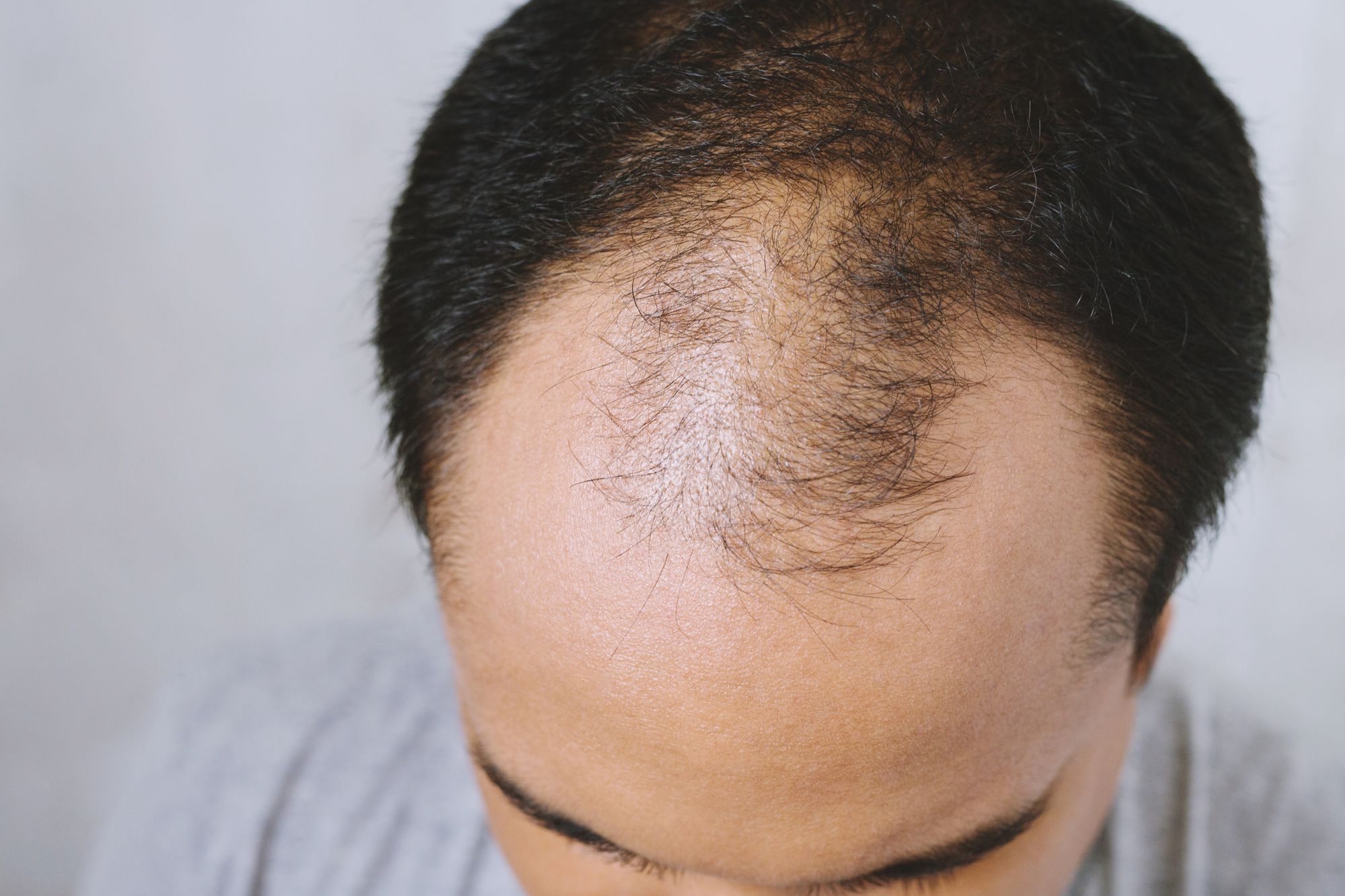
HAIR LOSS FROM DRUGS, MEDICATIONS & VITAMINS
WHY DO SOME DRUGS AND VITAMINS CAUSE HAIR LOSS? Overview
While medications are taken to target specific health issues, they can also disrupt the normal function of your hair follicles, which are responsible for hair growth. In the case that your hair follicles become disrupted or damaged, your body may send the natural growth of your hair into a resting phase called telogen effluvium, or a more severe condition, anagen effluvium.
Medications That Can Cause Hair Loss
When most people think of hair loss as a side-effect of a medication, most will immediately think of chemotherapy and drugs used for cancer. While these often cause anagen effluvium, it is only one of the many types of drugs and medications that cause hair loss. Other commonly prescribed medications that can lead to hair loss are addressed below and include:
- Acne medications with Vitamin A
- Amphetamines
- Antibiotics
- Antidepressants and blood thinners
- Birth control
- Cholesterol-lowering drugs
- Immune system suppressants
- High blood pressure medications
- Steroids (anabolic)
- Vitamin B
- Weight loss drugs
|
I |
Additional drugs that may cause hair loss | ||
| Acitretin | Colchicine | Lithium | |
| Allopurinol | Corticosteroids | Nicotinic Acid | |
| Amiodarone | Drugs | Nitrofurantoin | |
| Amphetamine Tricyclics and Amphetamines | Gentamicin | Oral Contraceptives | |
| Anabolic | Heparin | Propylthiouracil | |
| Beta Blockers | Itraconazole | Salicylates | |
| Bromocriptine | Immunoglobin | Sulfasalazine | |
| Captopril | Interferon | Steroids | |
| Carbimazole | Isoniazid | Terfenadine | |
| Chemotherapeutic | Isotretinoin | Vitamin A | |
| Cimetidine | Levodopa |
Warfarin |
|
VIDEO: CAN VITAMIN DEFICIENCIES CAUSE HAIR LOSS? Can Your Diet Make A Difference In Maintaining Your Mane?
HAIR LOSS AND ACNE MEDICATIONS WITH VITAMIN A Overview
Many commonly prescribed acne medications, such as Accutane®, are retinoid-derived drugs, meaning they contain high levels of vitamin A. At appropriate levels, vitamin A can be beneficial for your skin and hair growth. However, because it is a fat-soluble vitamin, the body stores excess amounts and it is relatively easy to build up a toxic amount in your system, which can result in hair loss.
Vitamin A And Hair Loss
When your body is deficient in vitamin A, it can produce an energy-conserving response. When this occurs, hair growth is typically one of the first processes to be halted. This may lead to a decrease in hair cell regeneration and growth, causing the follicles to remain in the telogen, or resting phase, for a longer period than normal.
High levels of vitamin A can also have negative effects on hair growth as vitamin A is fat-soluble, which means that it is stored in the body's adipose tissue, so the body stores more of it than other vitamins that are water-soluble. Too much vitamin A can cause your hair follicles to reach the end of the growth phase at a much quicker pace, causing them to fall out faster than the body can replace the hair.
Additionally, vitamin A is considered an essential nutrient for healthy cell development. Among other roles in the body, vitamin A is a key component of gene transcription, skin health, and hair growth. Too much or too little vitamin A in the body can have devastating effects on a patient's health and can lead to organ damage over time.
Our hair restoration specialist can determine the cause of your hair loss and develop a customized solution.
Patients who are taking retinoid-derived medications may be building up a toxic amount of vitamin A in their bodies without knowing it. For many patients, discontinuing use of the drug may cause hair to begin regrowing. For others, the hair loss may be permanent.
Consuming A Healthy Amount Of Vitamin A
Typically, patients experience increased levels of vitamin A when taking supplements or drugs that contain retinoids, such as acne medications. The best way to ensure that you are not ingesting toxic levels of any vitamin is to avoid the use of supplements unless otherwise instructed by your doctor. You can ensure that you are consuming a safe amount of vitamin A by eating a healthy, balanced diet that includes foods such as:
- Eggs
- Fruits
- Leafy green vegetables
- Milk
While some patients may be able to halt hair loss by consuming the daily recommended amounts of vitamin A and discontinuing the use of certain medications, many patients may need to seek the assistance of a professional hair restoration doctor.
HAIR LOSS FROM ANTIDEPRESSANTS AND BLOOD THINNERS Overview
At The Hair Loss Doctors By Robert J. Dorin, we commonly see patients who have suffered hair loss due to antidepressants and blood thinners, as well as other medications. The type of hair loss experienced when taking these types of medications is called telogen effluvium. It causes hair follicles to enter the resting stage, which is also called the telogen phase. In this stage, more hair is shed, leading to widespread hair loss that typically affects the entire scalp.
Antidepressants And Hair Loss
Antidepressants are not prescribed exclusively to treat depression. They are also commonly recommended for patients who have been diagnosed with a number of other conditions, including:
- Attention deficit hyperactivity disorder
- Anxiety disorders
- Chronic neuropathic pain
- Mood disorders
- Menopausal symptoms
- Obsessive compulsive disorder
There are many different classes of antidepressants that work by altering the levels of certain neurotransmitters in the brain that can affect a patient's mood. It is thought that these changes in the brain's chemistry can trigger hair follicles to enter the resting phase, resulting in thinning or lost hair. Almost all antidepressants list hair loss as a possible side effect.
Blood Thinners And Hair Loss
Blood thinners are typically prescribed to patients who are at an increased risk of developing blood clots. These anticoagulant medications are also commonly recommended for patients who have an irregular heart rhythm, pulmonary embolism, or for those who have undergone certain types of surgery.
At The Hair Loss Doctors, we pride ourselves on finding hair restoration solutions for patients who have experienced hair loss after taking certain medications.
Blood thinners work by preventing the formation of the body's natural clotting mechanism. There has not been much research into why these medications can result in hair loss, but they are thought to trigger the resting phase for follicles, leading to hair being pulled out more easily, and a thinning appearance.
VIDEO: THE THE HAIR LOSS DOCTORS DIFFERENCE Hair Transplant Before / After Results For Men & Women
HAIR LOSS AND BIRTH CONTROL
What Causes Hair Loss From Birth Control?
The majority of birth control medications that are available today work by altering the levels of certain hormones in the body. When normal hormonal balance is interrupted, it can cause a number of side effects, including hair loss. Some oral contraceptives can trigger the production of androgen, which can result in male pattern hair loss.
Hormone-Based Birth Control Drugs
There are many different types of oral contraceptives that are available to patients. The majority of birth control pills contain synthetic versions of the hormones estrogen and progestin. An excess amount of these hormones can help prevent pregnancy by causing eggs to release early and making implantation more difficult. However, these hormones can also trigger the production of other chemicals that can affect your hair growth.
Hormones Affecting Hair Growth
When birth control medications cause the body to produce more androgen, it can affect hair growth. Androgen signals hair follicles to stop growing and enter into the resting phase. Hair follicles typically shed hair strands that are in the resting phase, leading to the appearance of thinning hair.
HAIR LOSS AND STEROIDS
Steroids And Hair Loss
Steroids are often thought to be a contributing factor to hair loss. Although steroids and other medications can play a role in losing hair, a genetic predisposition to hair loss must usually also be present.
How Steroids Affect Hair Growth
Steroids have a number of purposes. They are often prescribed by physicians to treat inflammation relating to conditions such as lupus. In other instances, anabolic steroids are prescribed to patients transitioning from female to male. Anabolic steroids are sometimes used illegally by athletes as a performance enhancer.
Steroids work by altering the levels of certain hormones in the body. Specifically, these drugs tend to increase dihydrotestosterone (DHT), which is known to cause damage and inflammation to hair follicles. Over time, the hairs within these damaged follicles will weaken and eventually fall out.
If you have suffered hair loss that may be related to steroids, The Hair Loss Doctors By Robert J. Dorin can help you find an effective solution.
Some patients who are not susceptible to hair loss may not experience this side effect from steroids. It is largely unknown why some have this genetic predisposition, but it is thought that some patients' hair follicles are able to withstand higher levels of DHT and are therefore not affected by steroid use.
Treatment Options For Hair Loss
If it is determined that a patient can safely stop taking steroids, that is the first recommendation for patients wishing to regrow their hair. Many patients will see hair regrowth within a few months after discontinuing use of the drugs. However, for other patients, the the appearance of thinning hair or complete loss of hair may be permanent. Fortunately, we offer several treatment options for patients who have experienced a permanent reduction.
HAIR LOSS AND VITAMIN B Overview
Hair growth is a delicate bodily function that can be affected by many factors, including our diets. For this reason, a Vitamin B deficiency and hair loss are often interrelated. While you may be able to improve thinning hair by integrating these vitamins into your diet more regularly, some patients will require professional hair restoration treatment. Temporary hair loss caused by Vitamin B deficiency can trigger a genetic hair loss condition that can often be permanent.
How Are Vitamin B And Hair Loss Related?
Generally, B vitamins such as B7 (biotin), B6, B12, and B8 (inositol) are needed to maintain healthy hair. When your body is not receiving the proper nutrients, it will make efforts to conserve energy for vital functions. Hair growth will be one of the first processes affected. Signs you may be deficient in B complex vitamins can include:
- Dry skin
- Difficulty sleeping
- Early gray hair
- Lack of energy
- Mouth ulcers
Due to the importance of these vitamins, it is important to take preventative measures to decrease your risk of deficiency.
Preventing Vitamin B Deficiency
Maintaining a well-rounded diet including whole grains, fruits, and vegetables should be sufficient for most people to prevent deficiency. However, many women experience hair loss during menopause and pregnancy due to a decrease in B12 and other nutrients. Groups with restricted diets such as vegans, those who have recently lost a substantial amount of weight, or patients with hyperthyroidism can often suffer from vitamin B deficiency and hair loss. For these types of patients, their primary physician can often provide sufficient nutritional counseling.
Treating A Hair Loss Condition Triggered By Vitamin B Deficiency
If your hair loss does not improve after increasing your vitamin B consumption, it may be the result of another condition. For some patients, the reduction in hair follicles in the growth cycle may activate a genetic predisposition, leading to prolonged hair loss.
Dr. Robert J. Dorin has helped many patients suffering from hair loss caused by a vitamin B deficiency by applying an individualized approach to every treatment.
YOU DON'T HAVE TO SETTLE FOR YHAIR LOSS Contact Us Today To Start Your New Life
If you are unhappy with the state of your hair, you are not alone. Most men and many women experience some degree of hair loss as they age. Thanks to modern hair transplant technology, hair loss does not have to be permanent.
We invite anyone curious about hair transplants to schedule a consultation with our medical team today. With several hair loss clinics in the Greater New York City area and one in Boston, we are now welcoming new patients and providing information on the variety of hair restoration treatments that could help you.
You can schedule your online or in-person consultation with The Hair Loss Doctors by filling out our online form or calling:
(516) 214-6776



